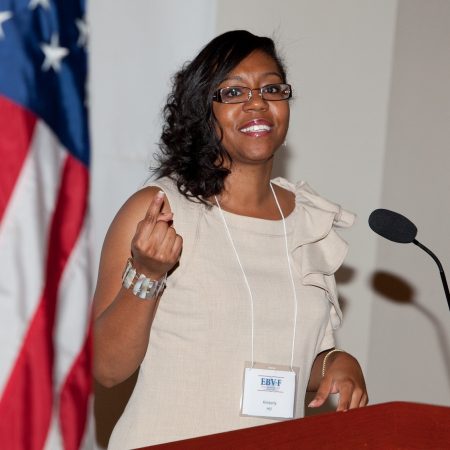
The closing ceremony for Florida State University’s inaugural Entrepreneurship Bootcamp for Veterans’ Families (EBV-F) was a celebratory occasion mixed with the bittersweet knowledge of the likelihood the 14 graduates would not see each other again.
Over the course of eight days of rigorous workshops and, at times, emotional sharing of life challenges they had never before expressed, the group had become fast friends, supporters and advocates for each other’s success. They all had something in common: They were spouses, survivors or caregivers of a wounded warrior — a military veteran who had sustained a disability or died in service to our country.
The 13 women and one man had come from across the country to immerse themselves in the essentials of successful entrepreneurship and learn how to make a living that would allow them to balance a business with family and caregiving responsibilities. Some of them had ideas for a new business, while others already were business owners who sought to take their ventures to the next level.
From 8 a.m. to 5 p.m. each day during the April 10-17 boot camp, they listened as faculty members from FSU and other universities and guest entrepreneurs shared their expertise in business-related topics, from writing a business plan, hiring an accountant and marketer to understanding the logic of profit and managing the supply chain. And, of course, making venture pitches that would garner investor support. During their personal time, they were charged with working on their individual plans. They Participants seemed to thrive on the grueling schedule that inspired camaraderie and optimism.
Earlier in the day on April 17, just hours before graduation, the participants, one by one, presented their business plans to a panel of potential “investors” from the local community who offered feedback on performance and the soundness of each participant’s plan. The investors heard pitches for a high-quality-fabric import business, a school that teaches sign language to parents so they can converse with their infants and toddlers, a threat-management consulting firm, and a business called “Number One,” which createds, manufactures and distributes easy-to-use urinals for men confined to beds or wheelchairs.
“I am feeling optimistic that I’m on the right track with my product, and this boot camp has given me the piece that I have felt has been missing,” said Patricia Sands of Arlington, Va., owner of Number One.
Dorian Van Horn of Dumfries, Va., who is preparing to retire after 25 years as an agent with the Naval Criminal Investigative Service and intends to start the a threat management consultancy, was looking forward to seeing her children after being away from them for the week, but she also was anticipating missing her fellow boot-camp participants after they went their separate ways.
“I know we’ll keep in touch,” she said. “I want to know about their successes, because each success will be a motivation and inspiration for the rest of us.”
Sponsored by the Center for Veteran Outreach in FSU’s College of Business, the EBV-F program is available to caregivers of veterans who have suffered disabilities related to their post-Sept. 11 military service, as well as to survivors of those who lost their lives.
The program integrates training in small-business management with caregiver and family issues, positioning the family member to launch and grow a small business in a way that is complementary or enhancing to other family responsibilities.
The EBV-F is an offshoot of FSU’s successful Entrepreneurship Bootcamp for Veterans with Disabilities (EBV), which was launched at Florida State in 2008.
“We saw the power of the EBV program for veterans — some of whom came accompanied by a spouse who is also a caregiver — and we thought, ‘Let’s also find a way to help a family member run a business, bring money into the home and still be able to care for their spouse,’” Blass said. “They are so appreciative that we are thinking about them and showing them the path that will lead to opportunity.”
The 14 EBV-F participants hailed from locations as distant as San Diego; St. Louis; Medford, Ore.; Colorado Springs, Colo.; Dallas; Indian Trail, N.C.; and Birmingham, Ala.




